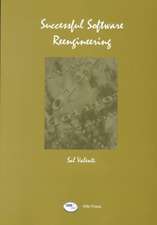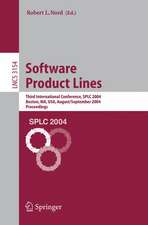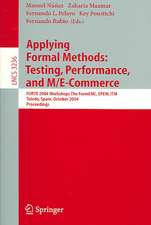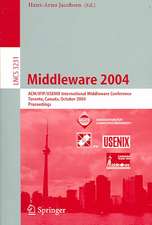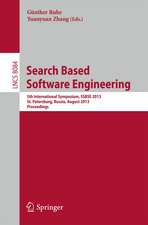Software Project Management in a Changing World
Editat de Günther Ruhe, Claes Wohlinen Limba Engleză Paperback – 23 aug 2016
The contributions are grouped into four parts, preceded by a general introduction. Part I “Fundamentals” provides in-depth insights into fundamental topics including resource allocation, cost estimation and risk management. Part II “Supporting Areas” presents recent experiences and results related to the management of quality systems, knowledge, product portfolios and global and virtual software teams. Part III “New Paradigms” details new and evolving software-development practices including agile, distributed and open and inner-source development. Finally, Part IV “Emerging Techniques” introduces search-based techniques, social media, software process simulation and the efficient use of empirical data and their effects on software-management practices.
This book will attract readers from both academia and practice with its excellent balance between new findings and experience of their usage in new contexts. Whenever appropriate, the presentation is based on evidence from empirical evaluation of the proposed approaches. For researchers and graduate students, it presents some of the latest methods and techniques to accommodate new challenges facing the discipline. For professionals, it serves as a source of inspiration for refining their project-management skills in new areas.
| Toate formatele și edițiile | Preț | Express |
|---|---|---|
| Paperback (1) | 342.46 lei 6-8 săpt. | |
| Springer Berlin, Heidelberg – 23 aug 2016 | 342.46 lei 6-8 săpt. | |
| Hardback (1) | 348.89 lei 6-8 săpt. | |
| Springer Berlin, Heidelberg – 17 sep 2014 | 348.89 lei 6-8 săpt. |
Preț: 342.46 lei
Preț vechi: 428.07 lei
-20% Nou
Puncte Express: 514
Preț estimativ în valută:
65.55€ • 68.17$ • 54.93£
65.55€ • 68.17$ • 54.93£
Carte tipărită la comandă
Livrare economică 14-28 martie
Preluare comenzi: 021 569.72.76
Specificații
ISBN-13: 9783662510919
ISBN-10: 366251091X
Pagini: 497
Ilustrații: XX, 477 p. 81 illus., 52 illus. in color.
Dimensiuni: 155 x 235 x 26 mm
Greutate: 0.69 kg
Ediția:Softcover reprint of the original 1st ed. 2014
Editura: Springer Berlin, Heidelberg
Colecția Springer
Locul publicării:Berlin, Heidelberg, Germany
ISBN-10: 366251091X
Pagini: 497
Ilustrații: XX, 477 p. 81 illus., 52 illus. in color.
Dimensiuni: 155 x 235 x 26 mm
Greutate: 0.69 kg
Ediția:Softcover reprint of the original 1st ed. 2014
Editura: Springer Berlin, Heidelberg
Colecția Springer
Locul publicării:Berlin, Heidelberg, Germany
Cuprins
1 Software Project Management: Setting the Context.- Part I — Fundamentals.- 2 Rethinking Success in Software Projects: Looking Beyond the Failure Factors.- 3 Cost Prediction and Software Project Management.- 4 Human Resource Allocation and Scheduling for Software Project Management.- 5 Software Project Risk and Opportunity Management.- Part II — Supporting Areas.- 6 Model-based Quality Management of Software Development Projects.- 7 Supporting Project Management through Integrated Management of System and Project Knowledge.- 8 A Framework for Implementing Product Portfolio Management in Software Business.- 9 Managing Global Software Projects.- 10 Motivating Software Engineers Working in Virtual Teams across the Globe.- Part III — New Paradigms.- 11 Agile Project Management.- 12 Distributed Project Management.- 13 Management and Coordination of Free/Open Source Projects.- 14 Inner Source Project Management.- Part IV — Emerging Techniques.- 15 Search-based Software Project Management.- 16 Social Media Collaboration in Software Projects.- 17 Process Simulation – A Tool for Software Project Managers?.- 18 Occam’s Razor and Simple Software Project Management.
Notă biografică
Günther Ruhe holds an Industrial Research Chair in Software Engineering at the University of Calgary. His main research interests are in the areas of product release planning, software project management, empirical software engineering and search-based software engineering. He is a Senior member of IEEE and a member of the ACM. In addition, he is the founder and CEO of Expert Decisions Inc., a University of Calgary spin-off company created in 2003.
Claes Wohlin is Professor of Software Engineering at Blekinge Institute of Technology, Sweden and a guest professor at Shandong University at Weihai in China. His main research interests include empirical methods and studies, software management, agile methods, software metrics, software process assessment and improvement, requirements engineering, software quality and global software engineering. He is a Senior member of IEEE and in 2011, he was elected member of the Royal Swedish Academy of Engineering Sciences.
Claes Wohlin is Professor of Software Engineering at Blekinge Institute of Technology, Sweden and a guest professor at Shandong University at Weihai in China. His main research interests include empirical methods and studies, software management, agile methods, software metrics, software process assessment and improvement, requirements engineering, software quality and global software engineering. He is a Senior member of IEEE and in 2011, he was elected member of the Royal Swedish Academy of Engineering Sciences.
Textul de pe ultima copertă
By bringing together various current directions, Software Project Management in a Changing World focuses on how people and organizations can make their processes more change-adaptive. The selected chapters closely correspond to the project management knowledge areas introduced by the Project Management Body of Knowledge, including its extension for managing software projects.
The contributions are grouped into four parts, preceded by a general introduction. Part I “Fundamentals” provides in-depth insights into fundamental topics including resource allocation, cost estimation, and risk management. Part II “Supporting Areas” presents recent experiences and results related to the management of quality systems, knowledge, product portfolios, and global and virtual software teams. Part III “New Paradigms” details new and evolving software-development practices including agile, distributed, and open and inner-source development. Finally, Part IV “Emerging Techniques” introduces search-based techniques, social media, software process simulation and the efficient use of empirical data, and their effects on software-management practices.
This book will attract readers from both academia and practice with its excellent balance between new findings and experience of their usage in new contexts. Whenever appropriate, the presentation is based on evidence from empirical evaluation of the proposed approaches. For researchers and graduate students, it presents some of the latest methods and techniques to accommodate new challenges facing the discipline. For professionals, it serves as a source of inspiration for refining their project-management skills in new areas.
The contributions are grouped into four parts, preceded by a general introduction. Part I “Fundamentals” provides in-depth insights into fundamental topics including resource allocation, cost estimation, and risk management. Part II “Supporting Areas” presents recent experiences and results related to the management of quality systems, knowledge, product portfolios, and global and virtual software teams. Part III “New Paradigms” details new and evolving software-development practices including agile, distributed, and open and inner-source development. Finally, Part IV “Emerging Techniques” introduces search-based techniques, social media, software process simulation and the efficient use of empirical data, and their effects on software-management practices.
This book will attract readers from both academia and practice with its excellent balance between new findings and experience of their usage in new contexts. Whenever appropriate, the presentation is based on evidence from empirical evaluation of the proposed approaches. For researchers and graduate students, it presents some of the latest methods and techniques to accommodate new challenges facing the discipline. For professionals, it serves as a source of inspiration for refining their project-management skills in new areas.
Caracteristici
Readers learn about latest trends and understand the implications of their implementations Selection of topics based on knowledge areas as listed in the Software Edition of the Project Management Body of Knowledge (PMBOK) Broad coverage of topics from fundamental issues to emerging techniques Includes supplementary material: sn.pub/extras













